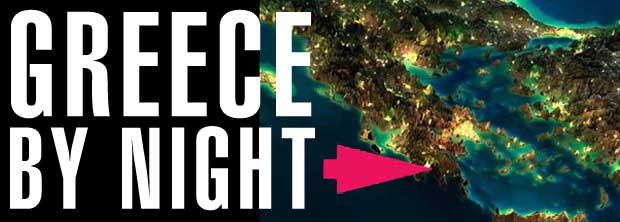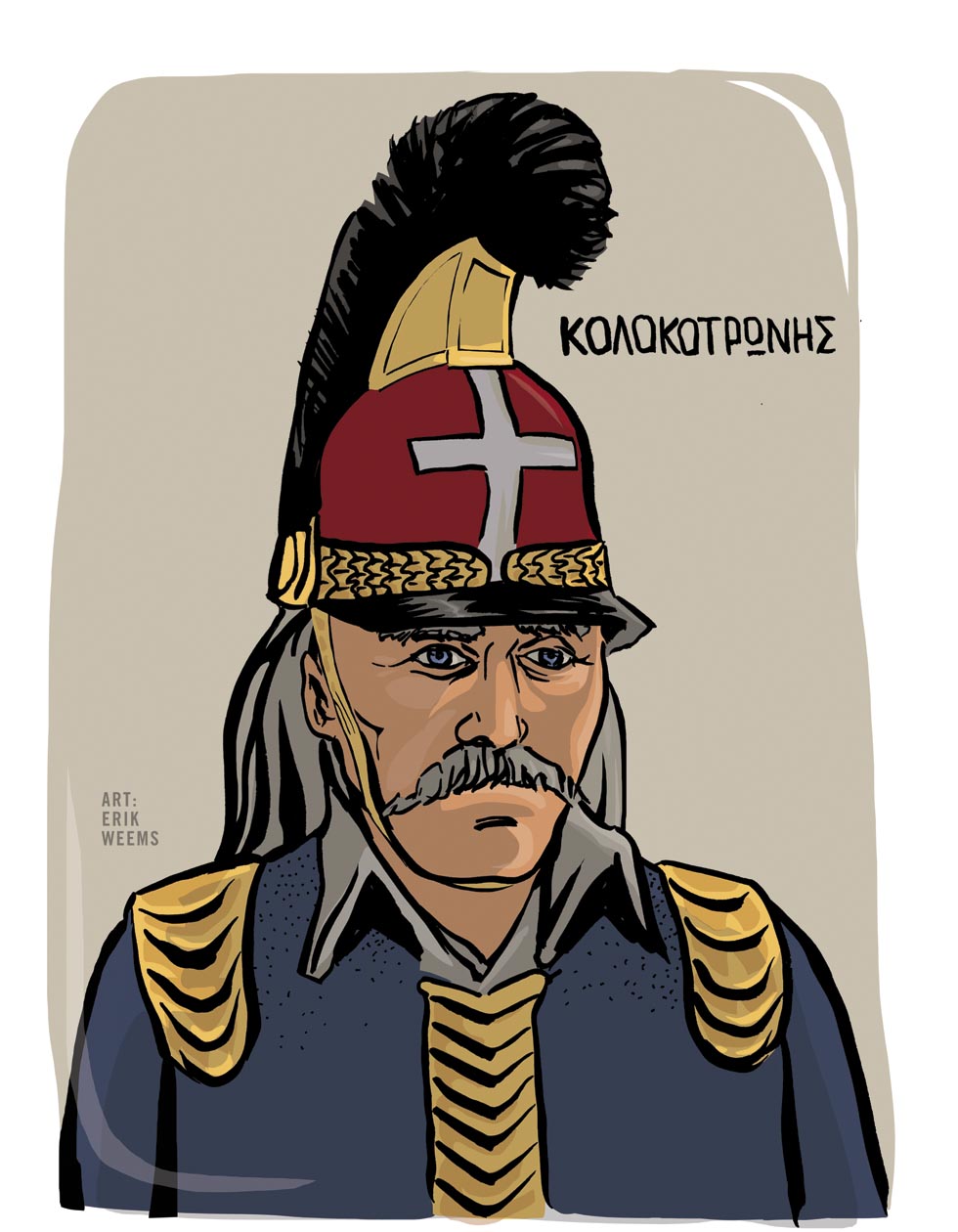Theodoros Kolokotronis
(Also spelled Theodore Colocontranes)
1770-1843
Important leader of the Greek revolt against the Ottoman Turks during the War of Independence
Kolokotronis is one of the most famous heroes of Greek history, and is particularly credited with leading Greek military units against the Ottoman Turk army occupying Greece during the Greek Revolution.
Along with Ionnis Kapodistrias (who later became the first official President of Greece) and brigand leader Markos Botsaris, Kolokotronis had made a secret agreement in 1821 to coordinate the fight against the Turks. All three were members of the "Friendly Society" (Filiki Etairia, "friendly brotherhood" Φιλική Εταιρεία) which was made up of thousands of Greek merchants, intellectuals, church representatives and others who had been trying to organize European pressure and peaceful means to shift Ottoman control off of Greece. By the time Kapodistrias and Botsaris met with Kolokotronis, patience with that strategy had worn out.
ADVERTISEMENT
Guide Book for the Peloponnese: with Athens, Delphi and Kythira – Paperback – Amazon – Bradt Travel Guides, 288 Pages, November 18, 2025
Koloktronis had led a career as a brigand (called "klefts") chief, and had also worked as a sometimes armed guard fighting against brigands. His father was killed by Turks during the "Orlov Revolt" in 1780. In 1805 a Turk crackdown on Kleft clans forced Koloktronis to flee to Zante in the Ionian islands which were under British protection. There, he imported cattle which he sold to the British army, and was invited to enlist into one of two British military units organized by Sir Richard Church to be made up of Greeks. Koloktronis advanced quickly and when he left British service he held the rank of Major.
He then organized Greek units in the Peloponnese and began fighting skirmishes around villages, and then as his forces enlarged, he took on larger areas under Ottoman control. When a Greek force under Demetrios Ypsilantis (at Larissa castle, the fortress of Argos) resisted an Ottoman force coming to the rescue of Naplion which was under seige by Greek forces, Koloktronis was able to hastily move a force to the Dervenaki Pass where he was able to entrap and destroy the larger Ottoman force trying to escape up through Corinth.
An interlude of civil war between competing Greek political forces kept Koloktronis occupied for three years (he was in jail for a brief time by virtue of being on the losing side in one of the various political squabbles among the Greek leadership), but in 1825 he was named commander-in-chief of all Greek forces in the Peloponnese. Meanwhile, fighting on the Greek mainland had tilted one way and then another, and a disastrous lack of coordination between British and Greek forces allowed for a resurgence of Ottoman power around Athens which was coupled with the success of the newly arrived Ottoman-backed Egyptian forces in the Peloponnese led by Ibrahim Pasha. The severe ruthlessness of Ibrahim's campaigns on the mainland and in "Morea" (Pelopponnese) and the resulting bad publicity across Europe brought about a European-backed force of combined naval units of British, French, and Russians strangling the Ottoman supply line and blocking reinforcements. This along with the continued actions of Greek guerilla forces forced Ibrahim to surrender and exit with his army on October 1, 1828.
Involved in post-war politics, Kolokotronis supported Ioannis Kapodistrias and a plan for an alliance with Russia, but Kapodistrias was assassinated and then replaced by his younger brother Augustinos Kapodistrias. Augustinos rule was marked by political chaos and in six months Otto of Bavaria was offered the throne of Greece. This was initiated officially via the Kingdom of Greece, which was established in 1832 at the Convention of London by the British, French and the Russians, followed by a final agreement at the Treaty of Constantinople. In this agreement, the power of the Greek provisional government formed during the revolution was superceded by a new formal government outlined and in agreement between the European leadership and the defeated Ottoman powers.
Following this, Greece was primarily ruled by regents sent by King Otto, and though Kolokotronis originally backed the Bavarian, he then moved to oppose the regency in Athens. On June 7, 1834, Kolokotronis was charged with treason and sentenced to death, but by 1835 had been pardoned.
Kolokotronis then lived mainly in Athens in retirement where he completed an autobiography ("Memoirs from the Greek War of Independence, 1821-1833"), and where he died in 1843. The day before his death, Kolokotronis' son Konstantinos was married to Eleni Mavromichali at the Royal Palace, with King Otto in attendance.
Theodoros Kolokotronis
Born April 3, 1770 Ramοvouni, Ano Dorio, Messenia (southwest Peloponnese).
Died February 4, 1843, Athens, Greece
Further reading:
Athens - From Ancient Ideal to Modern City, by Robin Waterfield. Published by Basic Books, 2004
Memoirs from the Greek War of Independence, 1821-1833 – publication record
Excerpt from the book "The Greek Adventure" by David Howarth
Copyright 1976 by David Howarth.
[David Howarth, 1912-1991, was a british writer who specialized in historical and military history. His writing contains a certain informal element punctuated with humor that make his books entertaining while still factually accurate and analytical in the format of a mainstream, popular history.)
NOTE: The spelling for Kolokotronis name varies in English language history books)
"...Colocotrones had no hereditary rank and no tribe or territory of his own; he said he was born in the mountains under a tree. His forebears had been fighters for at least a hundred years, sometimes as brigands and sometimes in the armed guards the primates maintained as a kind of police force - sometimes, in other words, against the law and sometimes on its side. But in his father's time, the brigands had been too successful and rapacious, and the Turks had made a special effort to put an end to them. His father was killed, and he himself had to flee the country and go into exile in the Ionian Islands. It gave him a standing grudge against the Turks, but to be fair one must add that they were not to blame. It was the Greek peasants who suffered most from the brigands' raids, and they had asked the Turks to protect them from their own compatriots.
...He had two kinds of critics: the men who wanted to do what he did but were not so good at it, and the men from abroad who imported the foreign idea of national patriotism, and expected a leader at least to try to disguise his private ambition with patriotic slogans, in short, he was the kind of leader the peasants and brigands wanted, but not the kind the foreigners thought they ought to want: and it remains a matter of taste to prefer the bare-faced brigand or the wily phanariot.
...He was one of the early members of the Hetairis, and before the revolution started he left the British service and went secretly back to the Peloponnese and waited. By then, he was fifty.
Thus he became the only native leader in Greece who had served in a European army. His European critics afterwards said he had not learned anything from the experience. But more probably he had the common sense, which they did not, to see that no human power could turn the Greek brigands and peasants into a formal army, or persuade them to drill and manoeuvre and fight in the disciplined ranks that Wellington or Napoleon commanded. When he came home after fifteen years in exile, plenty of men remembered his reputation as a brigand chief and were ready to join him; so he simply became a brigand chief again, with a brigand's technique of strategy and tactics.
...The Greeks' habit of running away when a battle seemed to be going against them was one of many things that scandalized European officers a little later; for the officers, who began to arrive in Greece before the year was out, were schooled in the virtue of fighting to the last round and the last man. But running away was not a custom peculiar to the Greeks; it was the common-sense tactic of guerilla fighters anywhere, and it was really of more practical use than the heroic death that European armies glorified. Colocotrones may have thought the rout of his men was a set-back, but certainly not a major disgrace or disaster: they knew very well they could not fight against cavalry, so it was stupid to try.
That was not the only habit that shocked the foreign officers, who had fought either for or against Napoleon. They disapproved entirely of the Greeks' idea of tactics, and never made any attempt to understand them..."
From the book The Greek Adventure, Lord Byron and Other Eccentrics in the War of Greek Independence, Copyright 1976 By David Howarth. From the chapter Revolt.
You will see Amazon links on this web site because I am an Amazon affiliate. I earn from qualifying purchases.
Amazon: The Greek adventure: Lord Byron and other eccentrics in the War of Independence
See more Greece History



Greece's Golden Visa program

